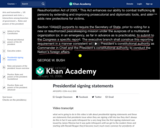
An introduction to the informal power of presidential signing statements.
- Subject:
- Political Science
- Social Science
- Material Type:
- Lesson
- Provider:
- Khan Academy
- Provider Set:
- Khan Academy
- Author:
- Sal Khan
- Date Added:
- 07/16/2021

An introduction to the informal power of presidential signing statements.
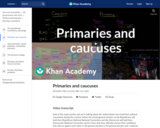
How states choose their delegates for the national party conventions (video content under CC-BY-SA license). Created by Sal Khan.

This unit asks students to consider civil rights inside the prison as they conduct a mock trial. By participating in a mock trial, students will not only learn about the litigation process, but will also learn about how democratic values and principles can be applied to specific situations, why people disagree on when and how they should be applied, and how the courts are important in providing a forum for contestation and resolution of such disputes and in ensuring that our commonly held values and principles are protected.
This Unit contains 6 lessons:
Lesson 1: What is this case about?
Lesson 2: Understanding the Evidence
Lesson 3: Developing an Outline for the Case
Lesson 4: Preparing for Trial
Lesson 5: The Trial
Lesson 6: Debrief and Reflection
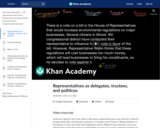
Classifying different roles for members of Congress.

An overview of Responsibilities of citizenship. Created by Kimberly Kutz.
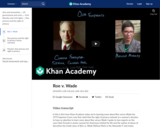
A deep dive into Roe v. Wade, a 1973 Supreme Court case that extended the right of privacy to a woman's decision to have an abortion, while recognizing compelling state interests in potential life and maternal health. In this video, Kim discusses the case with AUL Senior Counsel Clarke Forsythe and Professor Melissa Murray.
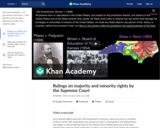
How the United States Supreme Court has at times allowed the restriction of the civil rights of minority groups and at other times has protected those rights. Plessy v. Ferguson, Brown v. Board of Education and Shaw v. Reno.
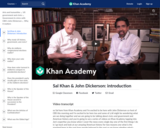
Sal Khan and John Dickerson kick off a series of videos focused on how current events relate to US history and civics. John Dickerson is co-host of CBS This Morning. He was previously CBS News' Chief Washington Correspondent, Political Director and anchor of Face The Nation. Dickerson is also a contributor to Slate's Political Gabfest and to The Atlantic. During the 2016 presidential campaign, Dickerson moderated CBS News' two presidential debates. Prior to CBS, Dickerson was Slate Magazine's Chief Political correspondent and covered politics for twelve years for Time magazine.
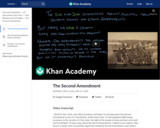
A deep dive into the Second Amendment, which states that "A well regulated Militia, being necessary to the security of a free State, the right of the people to keep and bear Arms, shall not be infringed." In this video, Kim discusses the Second Amendment with scholars Alan Gura and Adam Winkler.
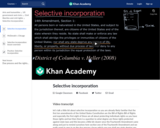
The judicial doctrine of selective incorporation and how it uses the due process clause as its justification.
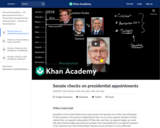
An overview of Senate checks on presidential appointments.
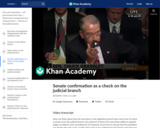
Senate confirmation as a check on the Judicial Branch.
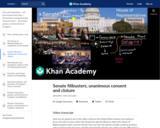
Role of Senate in ratifying treaties and confirming appointments. Role of unanimous consent, holds, filibusters and cloture in the United States Senate.
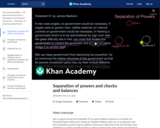
Separation of powers and checks and balances and Federalist 51.

Definition and examples of national service. Created by Kimberly Kutz.
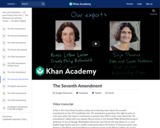
The Seventh Amendment protects jury trials in civil cases. In this video, Kim discusses the Seventh Amendment with scholars Renee Lettow Lerner and Suja Thomas.
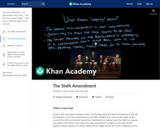
A deep dive into the Sixth Amendment, which guarantees citizens the right to a speedy and public trial. In this video, Kim discusses the Sixth Amendment with scholars Stephanos Bibas and Jeffrey Fisher.
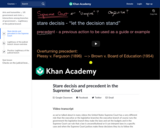
How the Supreme Court uses the principal of stare decisis when incorporating precedent into decisions.
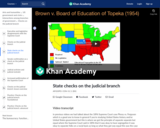
Brown v. Board of Education and how some states tried to get around it.
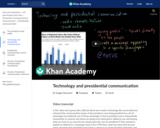
How have new forms of communication technology, like social media, affected the president's power to communicate with the public?